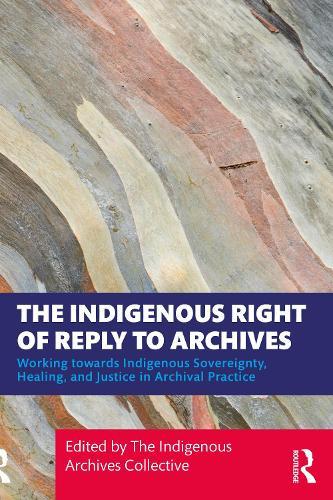Overview
This book brings together leading Indigenous and allied thinkers, practitioners, and advocates to address the critical issue of the Right of Reply in archives — foregrounding truth-telling, cultural safety, and Indigenous sovereignty across GLAM institutions. Collecting institutions have shaped and maintained records produced by colonial systems of administration and continue to play a role in perpetuating colonial paradigms that are inherently resistant to the needs and priorities of Indigenous peoples. Against this backdrop, this book embarks on a scholarly investigation into the concept known as the 'Right of Reply.' This concept speaks to Indigenous peoples' right to update, correct, critique, or enhance Indigenous knowledge that is held in collecting institutions. Spanning creative responses, case studies, policy critiques, and international perspectives, the volume explores how the Right of Reply operates as a political and ethical imperative in the work of archives. Contributors examine Indigenous-led protocols, the impact of colonial recordkeeping, digital repatriation, metadata annotation, and structural transformation in Australia, Aotearoa, and the United States. The volume offers a blueprint for decolonising archives and centring Indigenous agency, illuminating the innovative strategies being implemented across institutional and community settings. It is essential reading for archivists, curators, scholars, and anyone committed to transforming GLAM practice.
Full Product Details
Author: The Indigenous Archives Collective
Publisher: Taylor & Francis Ltd
Imprint: Routledge
Weight: 0.360kg
ISBN: 9781032770987
ISBN 10: 1032770988
Pages: 174
Publication Date: 30 September 2025
Audience:
Professional and scholarly
,
College/higher education
,
Professional & Vocational
,
Postgraduate, Research & Scholarly
Format: Paperback
Publisher's Status: Active
Availability: Not yet available

This item is yet to be released. You can pre-order this item and we will dispatch it to you upon its release.
Reviews
When Indigenous and allied voices collaborate to reclaim narratives from institutional archives, healing begins. This transformative work invites new responses to historical records—shifting power, affirming sovereignty, and creating pathways toward justice. An essential guide for anyone committed to meaningful reconciliation through collaborative stewardship. Laura McBride, Wailwan, Director, First Nations, Australian Museum This book is a how-to guide on putting decolonial principles into practice. It is essential reading for anyone interested in activating archival traces to envision and enact more just societies. Michelle Caswell, Professor, Department of Information Studies, UCLA
When Indigenous and allied voices collaborate to reclaim narratives from institutional archives, healing begins. This transformative work invites new responses to historical records — shifting power, affirming sovereignty, and creating pathways towards justice. An essential guide for anyone committed to meaningful reconciliation through collaborative stewardship. Laura McBride, Wailwan, Director, First Nations, Australian Museum This book is a how-to guide on putting decolonial principles into practice. It is essential reading for anyone interested in activating archival traces to envision and enact more just societies. Michelle Caswell, Professor, Department of Information Studies, UCLA
Author Information
The Indigenous Archives Collective is an international network of Indigenous and allied archivists, scholars, and practitioners advocating for Indigenous sovereignty in archives. Grounded in values of respect, integrity, and social justice, the Collective advances truth-telling, cultural safety, and systemic change across the GLAM sector through dialogue, collaboration, and community-led practice.



